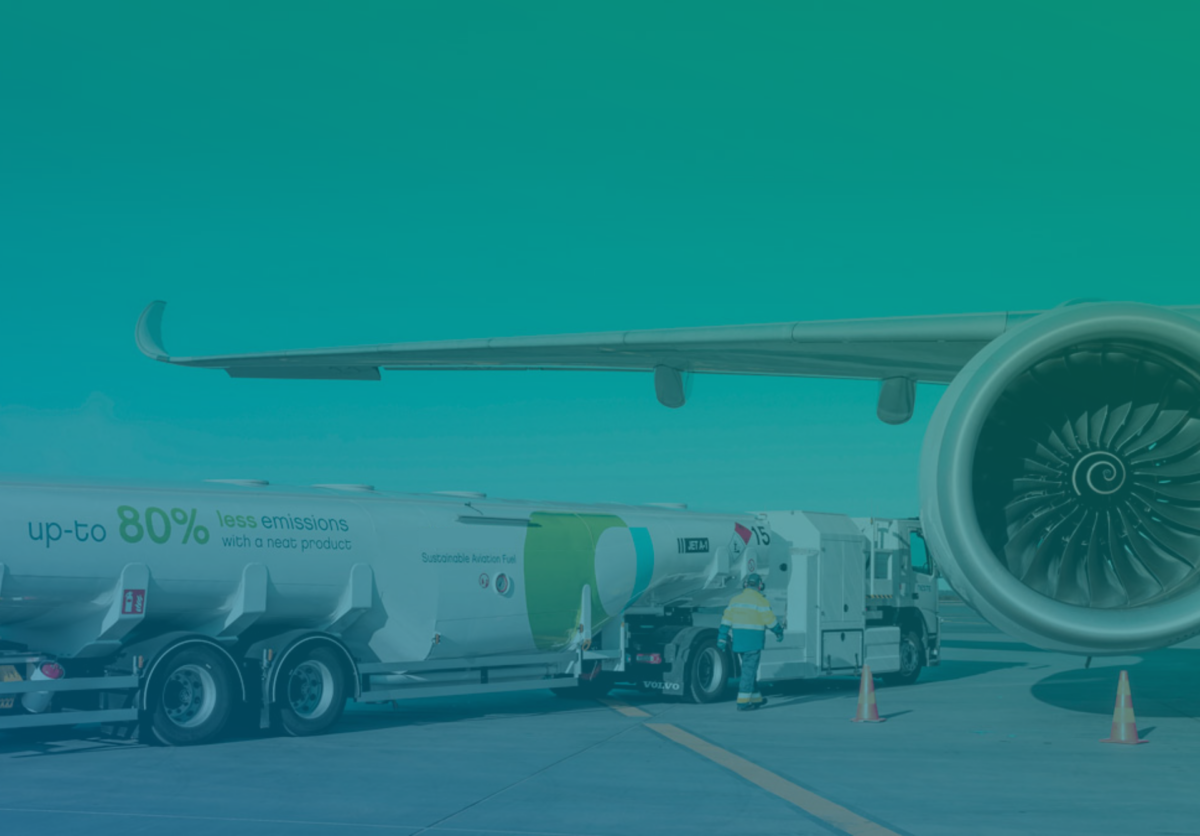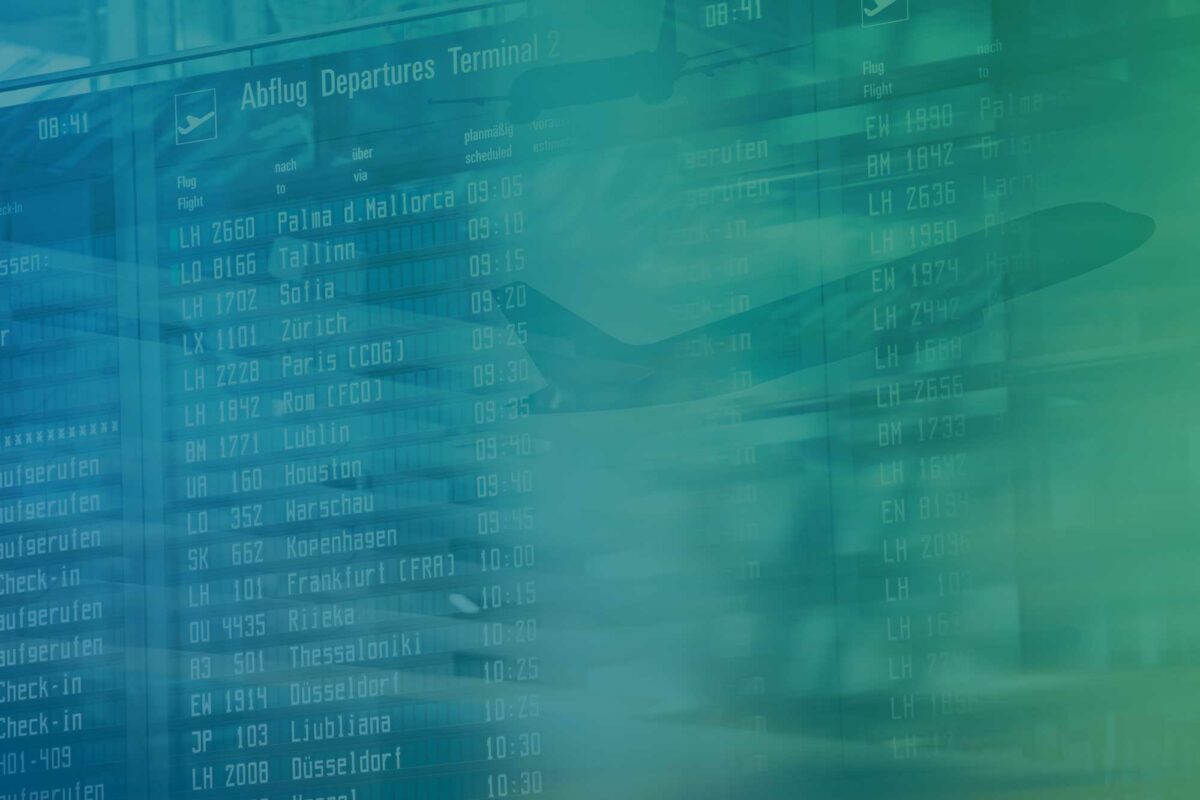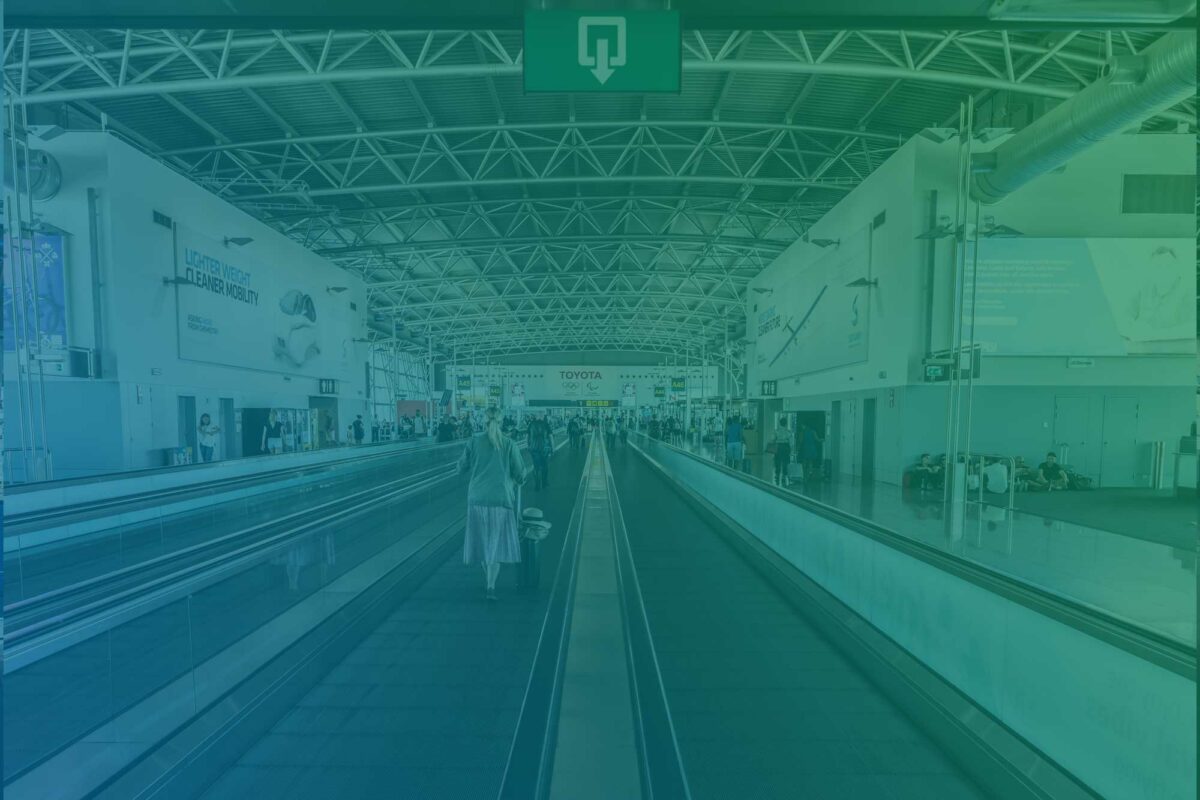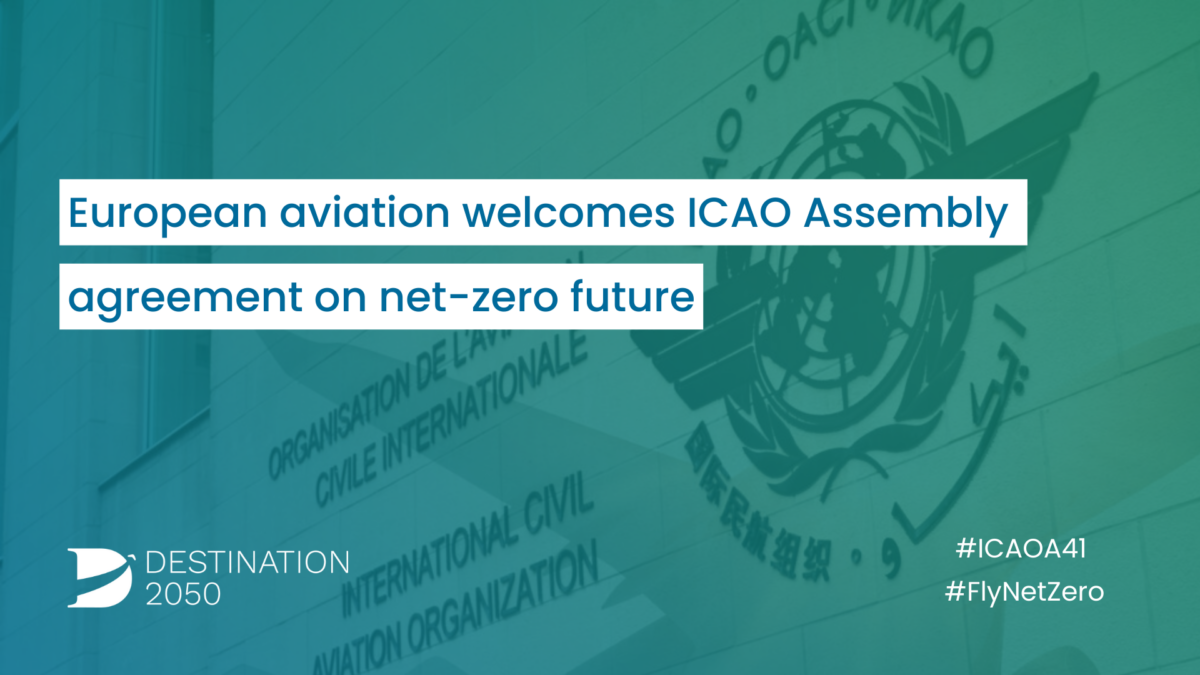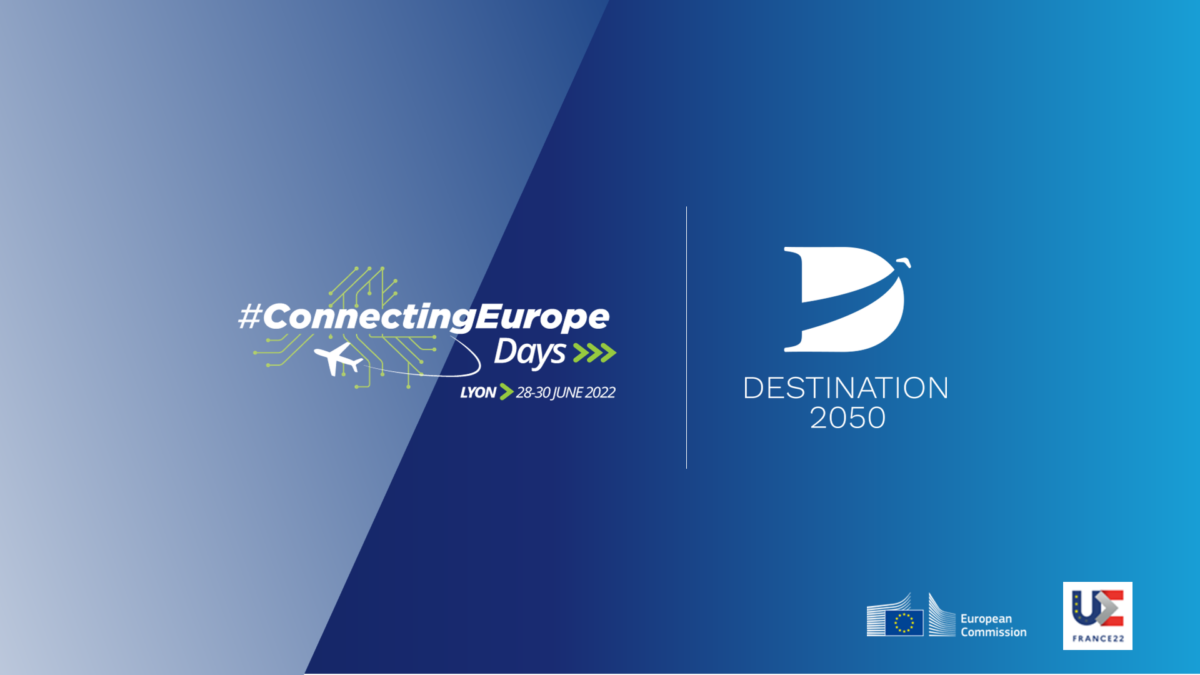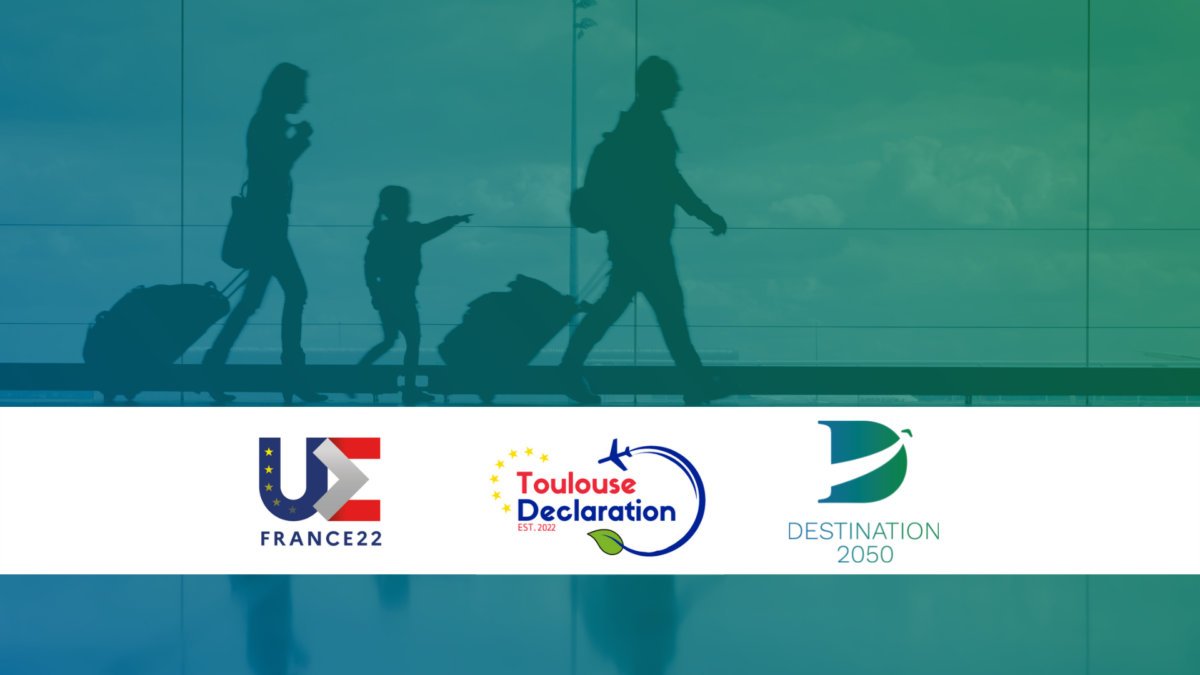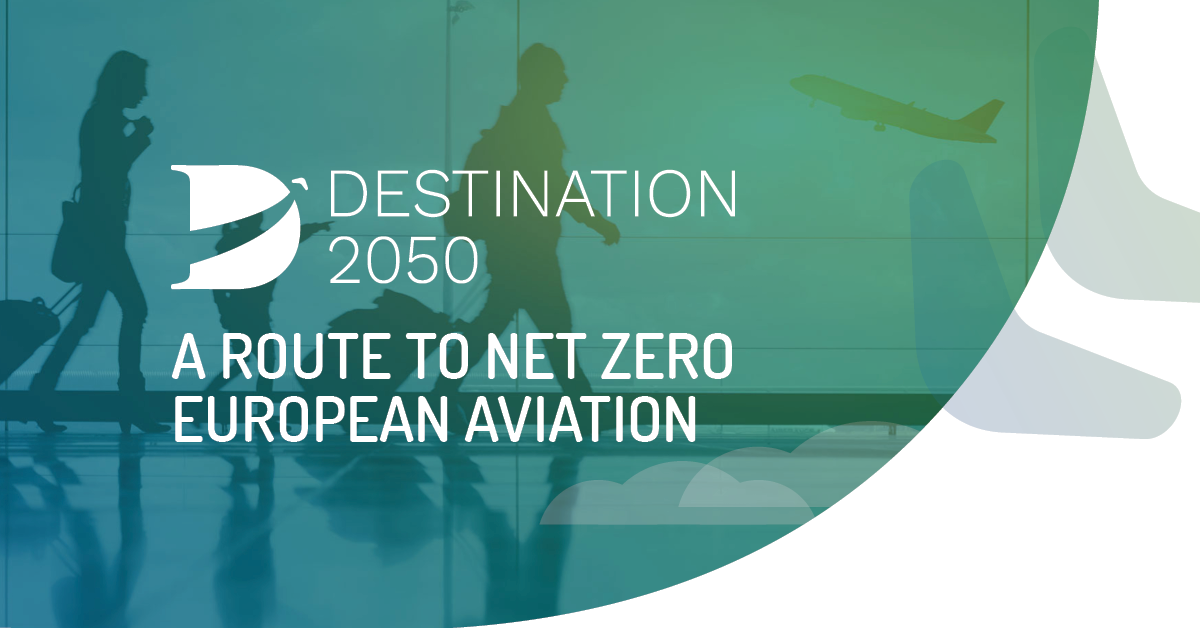- Opportunity to reach net zero CO2 emissions through a combination of measures, making flying more sustainable for the long term.
- Sector calls for decisive action from both governments and industry to achieve this net zero vision by 2050, while upholding international competitiveness and aviation’s benefits to society.
Brussels, 11 February 2021 – Europe’s aviation sector today unveiled its flagship sustainability initiative, Destination 2050 – A Route to Net Zero European Aviation. Driven by a new, independent report, it provides a vision and path for meaningful CO2 emission reduction efforts in Europe and globally. This follows recent climate commitments announced by the sector last November in the Round Table Report on the Recovery of European Aviation which called upon institutional stakeholders to join the sector in an EU Pact for Sustainable Aviation by the end of 2021 – a call reiterated today.
Building on the Paris Agreement and the European Green Deal, Destination 2050 sees all flights within and departing the EU, UK and EFTA realising net zero CO2 emissions by 2050. The ambitious plan and related commitments laid out by Europe’s airlines, airports, aerospace manufacturers and air navigation service providers shows collective leadership of the European aviation sector to reduce CO2 emissions, with the goal of making leisure and business air travel in Europe, and globally, more sustainable in the long term.
According to the report, there is an opportunity to reach net zero CO2 emissions by 2050 through a combination of four key measures, aligning European aviation with EU climate goals – subject to securing the required supporting policy and financing framework at EU and national level. These four measures include:
- Improvements in aircraft and engine technologies could achieve emission reductions of 37%
- Using sustainable aviation fuels (SAFs) could achieve emission reductions of 34%
- Implementing economic measures could achieve emission reductions of 8%
- Improvements in air traffic management (ATM) and aircraft operations could achieve emission reductions of 6%
The Destination 2050 report further assumes an impact on demand due to the above measures, resulting in the net zero CO2 goal. Nevertheless, European air passenger numbers are projected to grow on average by approximately 1.4% per year between 2018 and 2050 without compromising the sector’s ability to reach net zero CO2 emissions by this point.
Destination 2050 highlights that to make the net zero vision for European aviation by 2050 a reality, while maintaining international competitiveness and aviation’s benefits to society — quick, decisive joint actions by governments and industry will be needed. Industry will need to continue to substantially invest in decarbonisation and innovation and make the necessary operational transitions, while governments will need to ensure a level playing field and facilitate the transition through incentives and by reducing investment risks with consistent and stable policy frameworks.
This is the first pan-European, industry-wide, long-term vision that comes with concrete solutions to the complex challenge of reducing CO2 emissions from commercial flights within and departing the EU, UK and EFTA. The initiative is led by five European aviation associations – Airports Council International Europe (ACI EUROPE), AeroSpace and Defence Industries Association of Europe (ASD Europe), Airlines for Europe (A4E), Civil Air Navigation Services Organisation (CANSO) and European Regions Airline Association (ERA). The report was made possible thanks to the work of the Royal Netherlands Aerospace Centre (NLR) and SEO Amsterdam Economics.
“This long-planned vision and roadmap for the future of European aviation underlines our sector’s commitment and determination to play our part in tackling climate change despite the current crisis. A robust regulatory framework will be paramount in achieving not only an environmentally sustainable future, but also a financially resilient and competitive European aviation industry as a whole. We remain committed to work with policy-makers to take aviation forward jointly for the next generation of travellers,” said Thomas Reynaert, Managing Director at A4E.
“The Air Traffic Management industry and the rest of the aviation sector in Europe have come together to present a solution to our common challenge – reducing carbon emissions, while still delivering valuable economic and social benefits. With improvements across the sector, we aim to make a meaningful impact and help to achieve Europe’s climate goals,” said Tanja Grobotek, Director Europe Affairs at CANSO.
“The decisive and tangible actions set out in this roadmap are unprecedented. Here we have an entire sector not just committing to decarbonisation, but actually charting the path to make it happen and effectively contribute to the EU’s Climate objectives and the Paris Agreement. But whilst we embrace our responsibilities, it is clear that we cannot do this alone. It takes two to tango. Now we need the EU to deliver the policy and regulatory framework that will enable us to deliver net zero European Aviation by 2050. We therefore urge institutional stakeholders to respond to our call and now join the EU Pact for Sustainable Aviation we tabled last November,” said Olivier Jankovec, Director General at ACI EUROPE.
“This is a pivotal moment for sustainability and innovation for many industries, including aviation. The European aviation sector will take a strong leadership and collaboration position through its strengths in innovation and technology. The achievement of the goals of this roadmap is possible provided that the EU and national governments play their part through increased public funding for civil aviation research & technology. This will also have wider benefits globally, taking into account the European aeronautics industry’s global leadership,” said Vincent De Vroey, ASD Civil Aviation Director.
“Robust economic measures and much needed government and regulatory support in the short term will be necessary to bridge the gap until innovation, technology and sustainable aviation fuels become more widely available to help our industry reach its environmental targets. Our industry wants to be a part of a clean recovery that has a lasting positive impact whilst still providing essential connectivity to Europe’s citizens; we will take positive steps to make it happen,” said Montserrat Barriga, Director General, ERA
END
About ACI EUROPE (Airports Council International)
ACI EUROPE (Airports Council International) is the European region of Airports Council International (ACI), the only worldwide professional association of airport operators. ACI EUROPE represents over 500 airports in 46 European countries. Our members facilitate over 90% of commercial air traffic in Europe: 2.5 billion passengers, 20.7 million tonnes of freight and 25.7 million aircraft movements in 2019. In response to the Climate Emergency, in June 2019 our members committed to achieve Net Zero carbon emissions for operations under their control by 2050, without offsetting.
About ASD Europe
ASD is the voice of European Aeronautics, Space, Defence and Security Industries, actively promoting and supporting the competitive development of the sector by advocating common positions towards European Institutions and International organisations.
About Airlines for Europe (A4E)
Launched in 2016, Airlines for Europe (A4E) is Europe’s largest airline association, based in Brussels. The organisation advocates on behalf of its members to help shape EU aviation policy to the benefit of consumers, ensuring a continued safe and competitive air transport market. With more than 720 million1 passengers carried each year, A4E members account for more than 70 per cent of the continent’s journeys, operating more than 3,000 aircraft and generating more than EUR 130 billion in annual turnover. Members with air cargo and mail activities transport more than 5 million tons of goods each year to more than 360 destinations either by freighters or passenger aircraft. Current members include Aegean, airBaltic, Air France-KLM Group, Cargolux, easyJet, Finnair, Icelandair, International Airlines Group (IAG), Jet2.com, Lufthansa Group, Norwegian, Ryanair Holdings, Smartwings, TAP Air Portugal, TUI and Volotea. Follow us on Twitter @A4Europe.
About Civil Air Navigation Services Organisation (CANSO)
The Civil Air Navigation Services Organisation (CANSO) is the global voice of air traffic management worldwide. CANSO Members support almost 90 percent of world air traffic. Members share information and develop new policies, with the ultimate aim of improving air navigation services on the ground and in the air. CANSO represents its Members’ views in major regulatory and industry forums, including at ICAO, where it has official Observer status. CANSO has an extensive network of Associate Members drawn from across the aviation industry. For more, visit canso.org.
About European Regions Airline Association (ERA)
Founded in 1980, European Regions Airline Association (ERA) is a non-profit trade association representing over 60 airlines and around 150 companies involved in European air transport and is the only association representing the entire spectrum of companies involved in European aviation. The association promotes the interests of European airlines by lobbying European regulatory bodies on policy matters, promoting the social and economic importance of air transport and its environmental commitments.
Media Contacts
ACI Europe
Virginia Lee, Director of Media and Communications
Email: virginia.lee@aci-europe.org
Phone: +32 2 552 09 82
ASD
Paul Kimon Weissenberg, EU Affairs Manager
Email: Paulkimon.weissenberg@asd-europe.org
Phone: +32 473 13 34 92
A4E
Jennifer Janzen, Communications Director
Email: Jennifer.Janzen@a4e.eu
Phone: +32 499 82 82 94
CANSO
Johnny Pring, Manager Europe Policy and Advocacy
Email: johnny.pring@canso.org
Phone: +32 493 53 61 24
ERA
Paula Bangle, General Manager Business Development & Communications
Email: paula.bangle@eraa.org
Phone: +44 1276 485558

